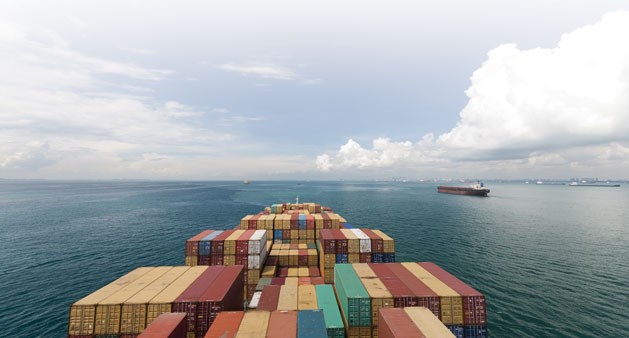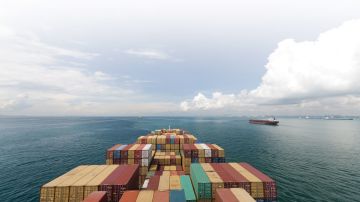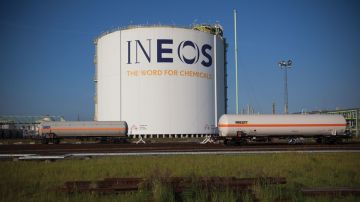Chemistry makes a world of difference to the world we live in. But can the European chemical industry, which directly contributes about €500 billion to the EU economy, convince its masters to listen to its concerns so that it can compete on the global stage? Only time will tell. But time is running out, as INEOS’ Tom Crotty explains.
Europe’s status in the world is under threat. Its petrochemical industry, which directly contributes €500 billion to the EU economy, today faces great challenges from outside and within.
But neither should be life-threatening if the European Union sees sense in time, says Tom Crotty, INEOS Group Director.
“Europe has a very clear choice,” he said. “Between a vicious circle of decline or a virtuous circle of improvement.”
Whichever choice it makes will be determined by two things: the EU’s environmental policies to decarbonize the planet and whether it exploits its own resources to bring down the spiraling cost of energy.
“Those are the two biggest issues facing the European Union,” said Tom.
Europe is now one of the most expensive places in the world to make petrochemicals. The Middle East is marginally still the cheapest place – but, thanks to its exploitation of shale gas, America is catching up.
“The EU has got a problem in that two of the major trading blocks that surround it are accessing much cheaper energy,” said Tom.
And it shows.
In France, INEOS’ Olefins & Polymers business spends twice as much as America to produce a ton of ethylene.
“The US business is our most profitable one and the European business scale-for-scale is probably our least profitable,” he said.
Cefic, the Brussels-based Trade Association which is the voice of the chemical industry in Europe as a whole, believes the situation will get worse this year before it gets slightly better next year.
“Cefic is forecasting modest growth of 1.5% next year,” said Tom, a Cefic board member. “It is modest growth, but it is real growth.”
That growth will be driven by the production of high quality, innovative, high value, environmentally-sound products for markets that demand the best, not necessarily the cheapest.
“If you are looking for a specific engineering plastic to make a key component for a brand new BMW, you are not going to go around and ask who’s cheapest, you are going to say: ‘Who’s best?’”
That – so far – has safeguarded Europe’s chemical industry.
“That is key to Europe’s future,” said Tom. “Without that protection Europe would be flooded by cheap chemical products.
“But we must continue to make highly technical products that are difficult for competitors to copy.”
One such product is made by INEOS. It specialises in making polymer that the French use for milk bottles. The plastic has to be able to stop chemicals seeping into the milk.
“It is not something a big plant in the Middle East can copy or would want to copy because many of them are too big for that,” said Tom.
But still, there is no margin for complacency.
Cefic is currently urging the European Commission not to impose additional environmental regulations in isolation from the rest of the world.
It warns if the EU pursues its 2050 environmental objectives and thereby drives up energy and carbon costs, it will undermine competitiveness and result in carbon leakage and a reduced level of investment in the European Union.
“The EU needs to take stock of its environmental policy-making because increasing regulations are driving up prices and it’s having a huge impact,” said Tom.
Cefic shares the European Commission’s objective to decarbonise the planet. What it does not agree on is how to achieve that.
“Imposing environmental regulations, in isolation from the rest of the world, will cause European chemical production to cease because we won’t be able to afford it,” he said.
“That won’t decarbonise the planet because those same products will still be used by Europe’s 350 million consumers. They will simply be imported from the likes of China where you’ll have the additional carbon from production and from transportation.
“So you will have increased the amount of carbon and also lost jobs and wealth from the EU.
“It makes more environmental and commercial sense to encourage European industries to do the right thing by using their technical expertise to create greener products,” he added.
Tom said a ton of PVC currently made in China using energy generated from coal fired power stations, emitted seven times more CO2 than a ton of PVC made in the EU. And that was without taking into account the carbon needed to transport it.
“It may be an extreme example,” he said. “But it is a real example.”
So the question is: Is the EU listening?
The European Commission’s Directorate-General Energy and Directorate-General Enterprise are, says Tom. But he’s not so sure about the Directorate- General Environment, which imposes the regulations.
“Their message is that the EU must set an example to the world,” said Tom. “But the reality is the rest of the world is not following. Europe is running in front and the Americans are saying ‘See you later. We are not going to screw up our industry or our economy’.”
Tom said carbon taxes would work only if they were imposed globally.
“It’s right that the best way to encourage companies to do something different is to make what they do now too expensive, and that is what carbon tax does,” said Tom.
“But everybody must do it.
“If a tax on carbon is introduced in the EU alone, then nobody upon nobody will run their industrial operations in Europe. They will operate in China, the Middle East or America.”
Cefic believes 9% growth is already needed just to bring European production back to where it was before the 2008-2009 downturn, which saw one of INEOS’ major competitors go bust.
“We bounced back from the downturn because our reliance on the car and construction industries was much less than our competitors,” said Tom. “For us it was really painful but it wasn’t terminal.”
Aside from the threat of carbon taxes, though, the chemical industry is also dismayed at the EU’s reluctance to unlock the natural gas trapped in shale rock and, in turn, help to lower production costs of energy for the industry and consumers in general.
“You can keep driving down your own costs but you can only go so far and that’s when you get into the energy policy issue,” said Tom.
“I know I sound like a broken record but it’s a huge issue for us.”
INEOS’ ChlorVinyls plant in Runcorn in the North of England currently uses as much power as the neighbouring city of Liverpool.
Cefic believes the European chemicals sector, which employs 1.2 million, will face tough competition again next year as it battles for growth from US producers who are benefiting from cheap energy and feedstock thanks to shale gas exploitation in America.
So far, the UK is European Union’s best hope for cheaper energy.
“There is no point in looking anywhere else in Europe at the moment because the opposition is too high,” said Tom.
Despite protests in the UK – such as happened in July at Balcombe, West Sussex – the British Government does support the search for shale gas, and has promised to hand control over important, complex, technical planning issues to the Department for Environment, Food and Rural Affairs (Defra) and the Environment Agency (EA) instead of local councilors.
Cuadrilla is one of a dozen UK companies, which have licenses to drill for shale gas.
INEOS – with a cracker at Grangemouth in Scotland that needs to find a long-term source of ethane gas to run it – is in talks with all of them.
“Clearly we would get involved because we are a customer,” said Tom. “But the question is: Do we want to get even more involved?”
“What we do know is that the North Sea ethane gas is virtually gone now and unless we find another source of gas we will be struggling to run the Grangemouth cracker after 2017,” said Tom.
In October INEOS announced it planned to invest £300 million in a terminal at Grangemouth so it can import cheaper liquefied gas from America, after staff agreed to support the site’s Survival Plan.
The Scottish Government has also indicated that it will provide a £9 million grant to help finance the terminal and the UK Government has given its pre-qualification approval for a £125 million loan guarantee facility, even if Scotland does vote to sever its 306-year-old ties with England in next year’s independence referendum.
“We need all their support,” said Tom.
Cracks start to appear in Europe
America’s ability to produce chemicals cheaply is already having a huge knock-on effect.
Worst affected is Europe’s chemical industry that uses mostly crude oil to produce the same products.
In a report published by KPMG in October 2012, Mike Shannon, global head of chemicals and performance technologies, forecast that it might cause some economic disruption.
“It may cause the shutdown of less lucrative assets – and possible countries blocking the flow of US exports to protect local production.”
Arguably it has already started in Europe, which is now one of the most expensive places in the world to manufacture petrochemicals.
In September, Total announced it planned to shut down a loss-making steam cracker in Carling, France. The naphtha cracker, which uses crude oil to make chemicals and has been struggling for the past five years, will close in 2015.
It will come as no surprise to KPMG, which, in 2009, forecast that 14 of the 43 crackers in Europe would become uneconomical by 2015 due to stiff competition from the Middle East, Asia and America.
Meanwhile, in America, with low-cost and abundant ethylene coupled with a slowdown in the growth of domestic demand, US companies are looking for expansion opportunities.
The US is already a net exporter of ethylene derivatives and the volume is expected to increase significantly.
















